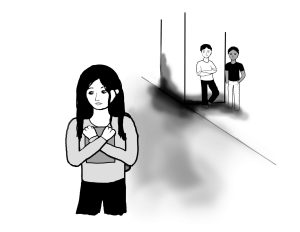“We live in a society that hates children,” a friend said to me nonchalantly this past week.
This was not something I was expecting to hear. It is generally more acceptable to claim that people love children. They can be delightful, kind, fun, smart, just like anyone else we know. So why did my friend’s comment ring surprisingly true?
I have always been suspicious of the overall lack of respect we have for children, and have surprised even myself at the demands I have made of children that I would never make of someone my age or older. In general, adults do not generally treat children as human beings who are capable of individual thoughts and decisions. We do not let children have authority over adults, but we also deny them authority over themselves. Society may not ‘hate’ children, but we make a vigilant effort to control them by making them completely dependent on the ideas of adults in their lives.
One example of how we control children is through our societal ideas about sex. French scholar Michel Foucault argued that the creation of technical and ‘expert’ language around ‘sexuality’ resulted in much stronger societal controls over the subject matter of sex. In the case of children and youth, they learn to see sex as something hidden, to be explored uncovered, because adults only talked about it in secrecy. But, unlike others who argued that society had subsequently succeeded in ‘repressing’ our natural sexuality, Foucault saw the stricter definitions around who gets to talk about sex, and how it is talked about, as resulting in greater control over minority groups in society, including children.
So, according to Foucault’s theory, the fact that sex is talked about with children, but only as something secretive, shameful and taboo, is what gives adults control over how children are allowed to speak about and experience their sexuality. In many families in the United States, it is unheard of for children and adults to talk about sexual matters in any manner other than a strictly educational, rational and scientific one. If adults do talk to children about sex, it is often with the strict caveat that the knowledge imparted will be not be practiced or applied until some later date in the future, when ‘children’ become ‘adults’, or at least ‘young adults’.
But, as many of us have seen, or have experienced ourselves when we were young, children are doing sexual things. Now, whether the existence of sexual practices among children is a problem in and of itself is up for debate, but the main point of my argument does not rely on this distinction. My concern is that we continue to speak and act as if children cannot do sexual things or even have sexual desires, while the evidence that they can is right in front of our faces or maybe looking us in the mirror. And, according to Foucault’s hypothesis, this false ‘repression’ of children’s sex and sexual practices does not result in the successful prevention of sexual experiences among children, but merely functions as a tool to make children less autonomous, and more dependent on the beliefs and actions of adults.
Whether you agree with Foucault’s ideas about ‘sexuality’ and children’s sexuality in particular, which I admit are a far cry from commonly-accepted ideas about sexuality in the United States, it should be clear that there is a problematic contradiction between how we talk about children and children’s sexuality, and what is actually happening. Furthermore, our ideas about sex encourage children to simply trust what adults tell them (or often don’t tell them) about sex, which can range from absolutely nothing to extremely abusive sexual relations with adults who take advantage of them. It is extremely worrying to me that children are not given the knowledge and information to ask adults questions about sex, even when those children find themselves in uncomfortable, harmful or abusive situations.
The way we speak with children about sex, as well as other complex, confusing and sometimes scary life experiences, reflects social structures that too often invalidate the life experiences of children. The line between childhood and adulthood is an ambiguous and complicated one, but it is unfair for adults in society to use their social privileges to treat children as inferior and incapable beings, whose understandings of themselves and of the world are less valued than those of adults.








